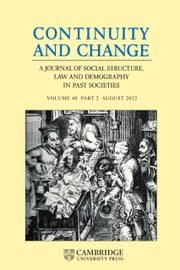Article contents
Shepherds, innkeepers, and census-takers: the 1905 census in two villages in Epirus
Published online by Cambridge University Press: 01 December 1997
Abstract
The origins of joint family households in the Balkans remain an issue of interest to many scholars of family history. This article focuses on the joint family household pattern recorded in the 1905 Ottoman census in two communities in Epirus. Related issues will also be discussed, such as the variations in household-formation behaviour within a community regarded as ‘ethnically’ homogeneous, the extent to which joint family households should be viewed as an intrinsic trait of the culture and economy of the Vlachs, and the problems that arise from relying exclusively on quantitative data for understanding household and family life.
The 1905 census, the last one undertaken by the Ottoman authorities, was intended to provide information on the Empire's ethnic composition, in a context of increasing unrest and tension caused by rising nationalist movements. The 1905 population listings of the two villages discussed in this article, the Vlach village of Syrrako and the Greek one of Aristi (or Artsista, the older version of the village's name, used before the trend to ‘Hellenicize’ Slav-sounding place names), are among the few such documents relating to Epirus to have been preserved. A relatively large body of literature on Epirus communities, produced by travellers, local historians, and geographers, furnishes additional information.
- Type
- Research Article
- Information
- Copyright
- © 1997 Cambridge University Press
- 5
- Cited by


